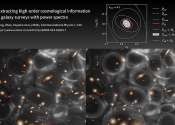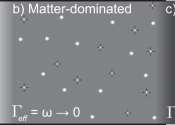In physical cosmology and astronomy, dark energy is a hypothetical form of energy that permeates all of space and tends to increase the rate of expansion of the universe. Dark energy is the most popular way to explain recent observations that the universe appears to be expanding at an accelerating rate. In the standard model of cosmology, dark energy currently accounts for 74% of the total mass-energy of the universe.
Two proposed forms for dark energy are the cosmological constant, a constant energy density filling space homogeneously, and scalar fields such as quintessence or moduli, dynamic quantities whose energy density can vary in time and space. Contributions from scalar fields that are constant in space are usually also included in the cosmological constant. The cosmological constant is physically equivalent to vacuum energy. Scalar fields which do change in space can be difficult to distinguish from a cosmological constant because the change may be extremely slow.
High-precision measurements of the expansion of the universe are required to understand how the expansion rate changes over time. In general relativity, the evolution of the expansion rate is parameterized by the cosmological equation of state. Measuring the equation of state of dark energy is one of the biggest efforts in observational cosmology today.
Adding the cosmological constant to cosmology's standard FLRW metric leads to the Lambda-CDM model, which has been referred to as the "standard model" of cosmology because of its precise agreement with observations. Dark energy has been used as a crucial ingredient in a recent attempt to formulate a cyclic model for the universe.








